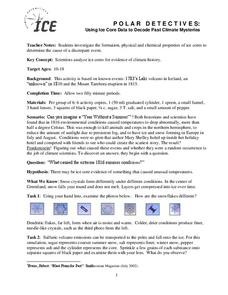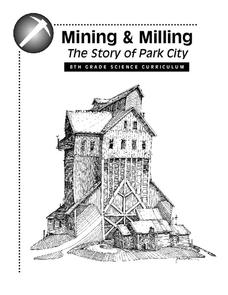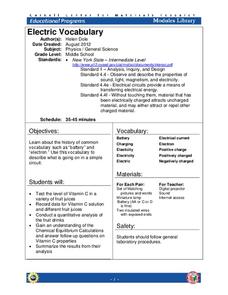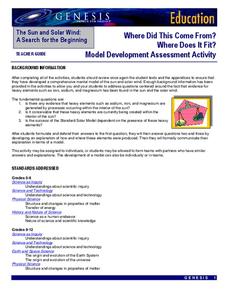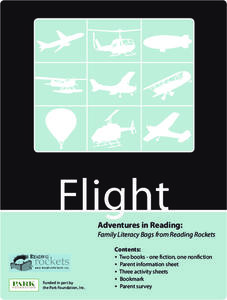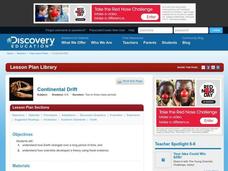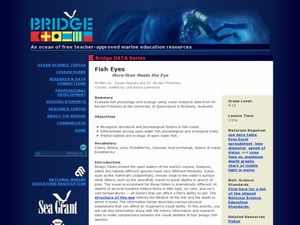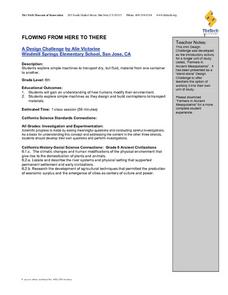Polar Trec
Polar Detectives: Using Ice Core Data to Decode Past Climate Mysteries
How does examining an ice core tell us about weather? Learners set up and explore fake ice cores made of sugar, salt, and ash to represent historical snowfall and volcanic eruptions. From their setups, scholars determine what caused the...
University of Colorado
Space Travel Guide
Neptune takes 164.8 Earth years to travel around the sun. In the fifth of 22 lessons, young scientists create a travel guide to a planet in our solar system. They provide tips for others on what to bring, what they see, and their...
University of Colorado
Strange New Planet
The first remote sensors were people in hot air balloons taking photographs of Earth to make maps. Expose middle school learners to space exploration with the use of remote sensing. Groups explore and make observations of a new planet by...
Park City Historical Society & Museum
Mining and Milling: The Story of Park City
Study the chemistry of mining! Through nine lessons in the unit, learners explore different concepts related to mining. Their study ranges from rock and mineral analysis to the environmental impact of dynamite and the chemical reaction...
Cornell University
Electric Vocabulary
Practice electric vocabulary using multiple methods. Learners begin by watching a video that explains vocabulary related to electric currents. They match vocabulary cards to practice and then create an electric circuit. Using the...
NASA
Model Development Assessment Activity
Time to show off what they've learned! The final lesson in the series of six asks young scholars to process their learning from the previous lessons. They identify possible elements of the sun as well as a possible origin.
ProCon
Universal Basic Income
Should the United States adopt a universal basic income? After reading brief background information, scholars research the debate topic by reviewing the top three pros and cons. They also respond to a survey question and review other...
GNS Science
Think like a Geologist: 1
How well do pupils play the role of geologist? Test their abilities in the first installment of a two-part series. Presented with a series of rock formation diagrams, learners write stories to match what they see in the diagrams. The...
PBS
Reading Adventure Pack: Flight
A Reading Adventure pack focuses on the invention of flight. After reading a fiction and nonfiction book, scholars take their newfound knowledge to design a one-passenger flying device, experiment with different types of paper airplanes...
Curated OER
Exploring our National Parks
Students utilize maps/Atlases to find key spatial information, locate U.S. National Parks, characterize the geography of a specific region, and create a National Park brochure.
Curated OER
Why Is A City Located Where It Is?
Students analyze how transportation influenced the development of Stillwater, Minnesota, They use the same techniques to analyze the impact of transportation on the origination and development of their own community.
Curated OER
Continental Drift
Be sure to come prepared to discuss the theory of Pangaea and the two super-continents, Laurasia and Gondwanaland. Collaborative learners look for fossil evidence that supports the theory that one super-continent divided into two. They...
Curated OER
Welcome to My World
Elementary schoolers discuss what a community is, and what their community has to offer them. They create posters, or flyers for the different businesses or places in their community to place around their school. After the learners have...
Curated OER
It's a Gas! Or is it?
Examine the effects of temperature and pressure on solubility and the states of matter of ocean water. Learners make inferences about the unique chemistry of ocean water at different depths. They engage in an activity related to...
Curated OER
Our States, My State
Here is a very nice lesson on the shape of the United States, and the shapes of the individual states for your young geographers. They utilize worksheets embedded in the plan to color in a variety of states and to become familiar with...
Curated OER
Dining Out With Fishes and Birds of the Hudson
While this lesson focuses on the birds and fish found on the Hudson River, it could be adapted for use in any classroom. Using a vocabulary list, learners explore the meaning of words like adaptation, habitat, barbel, and more. Then,...
Curated OER
ASL Lesson 11
Use this resource to learn or to teach ASL. Lesson 11 focuses on ASL grammar and function, asking questions, and using vocabulary such as never, sometimes, and always. Images and videos are available to help ensure proper form while...
Curated OER
Fish Eyes - More than Meets the Eye
Inform your class about the adaptations in fish eyes: cones, lens size, endothermy, and speed of vision. The adaptations are related to diving behavior. Junior marine scientists compare the adaptations of four different fish species to...
Curated OER
Using Primary Documents: The 1906 San Francisco Earthquake
Students examine primary documents from various key historical events, including those from the 1906 San Francisco earthquake. They discuss the importance of such documents.
Curated OER
Just How Small is a Nanoparticle?
Students determine the size of a nanoparticle. In small groups, they calculate the actual size of a particle shown in a photo, and discuss how they arrived at their answers.
Curated OER
Dell House Dig
Students demonstrate basic procedures for archeological excavations. They participate in an archaeological dig exploration off of Blackhawk Island in the Wisconsin River where the Dell House once stood.
Curated OER
Flowing From Here to There
Sixth graders discover how humans modify their environment. They work together to design their own simple machine to transport materials. They record observations and suggest modifications.
Curated OER
Silk Road Caravan
Students determine how the geographic features of the Silk Road trade route contributed to the economic development and diffusion of culture in both Eastern and Western Civilizations.
Curated OER
Stopping Deforestation in the Amazon: A Publicity Campaign
Students investigate the environment by designing a group project. In this ecology lesson, students identify the man made threats to the Amazon while reading environmentally conscience vocabulary terms. Students collaborate in groups...


